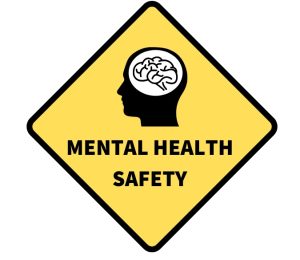 The strategy of triumphalism or learning from the suffering of others doesn’t work in helping people with mental health issues. Yet, this populist strategy is what Safety does most often (https://safetyrisk.net/playing-with-mental-health-in-safety-is-dangerous/).
The strategy of triumphalism or learning from the suffering of others doesn’t work in helping people with mental health issues. Yet, this populist strategy is what Safety does most often (https://safetyrisk.net/playing-with-mental-health-in-safety-is-dangerous/).
Yes, let’s parade out someone who has been critically injured in front of workers and tell them ‘don’t be dumb like me’.
Parading someone who shouts the message ‘this is how I suffered and overcame my demons’ doesn’t work. Similarly, getting 30 burly mining blokes on tiktok to shout out ‘we care about mental health’ is simply immature and dangerous nonsense. This is the kind of stuff of football chants and superficiality. You do this kind of stuff when you don’t have a clue of what to do. You do this when you think training entertainment is learning. You do this when you think mental health is brain-centric. This is what you do when you want to convince people you are doing something about mental health whilst doing nothing to tackle the causes of mental health. All fostered by the smoke screen of zero, the ultimate mantra for brutalism.
Effective learning in mental health does not come about through strategies focused on brain-centrism, individualism or cognitive strategies most commonly used by Safety. Unless mental health is understood through Socialitie, nothing will change. Human persons are fundamentally social and communal beings and mental health should NOT be understood as ‘brain-health’. The human Mind is about full personhood, not the working of the brain.
Unless the strategy for mental health and psychosocial well-being includes an understanding of interaffectivity and intercorporeality (Thomas Fuchs) (https://www.academia.edu/30974462/Intercorporeality_and_Interaffectivity), people will be entertained but nothing will happen. Learning concerns the fully embodied e-motion of persons (https://www.youtube.com/watch?v=6WN8RG1AHTA) to a different way of being (https://www.youtube.com/watch?v=mhWwoaoxIyc). Researching the work of neuroscientists like Damasio (https://www.sciencedirect.com/science/article/pii/S2451902217302343; https://www.mentalhelp.net/books/the-feeling-of-what-happens-by-antonio-damasio/), Fuchs (https://www.klinikum.uni-heidelberg.de/fileadmin/zpm/psychatrie/fuchs/critical_neuroscience.pdf) and Mark Johnson.
A shift in data is not learning.
To start to understanding why mental illness exists one could listen to this lecture by Thomas Fuchs (https://www.youtube.com/watch?v=djxpfGRytzc).
One could also read or listen to any of the work of Gabor Mate (The Myth of Normal – https://safetyrisk.net/the-myth-of-normal/; https://www.youtube.com/watch?v=AEpD2o6MZOk) or Besser Van Der Kolk (The Body Keeps the Score). One thing is for sure, I would not seek help in mental health from footballers, boxers, engineers or safety regulators!
Of course, a mature understanding of culture is essential to understanding the risk of mental health and psychosocial well-being. Here again we see Safety turn to the wisdom (NOT) of engineers and the safety worldview (behaviourism) to keep control of the definition of culture to make sure that nothing changes. ‘What we do around here’ indeed! This is the way (https://safetyrisk.net/best-fraud-in-safety-wins-this-is-the-way/)! And for god-sake, don’t talk about culture!
We know about mental ill health by social and communal dysfunction.
There are several things we can do positively to help with mental well-being:
- The first is to dump the binary, reductionist behaviourist worldview of Safety. It is also critical to reject the behaviourist, individualist models of resilience common in the marketplace.
- The second is to NOT seek any source (especially engineers or regulators) in safety for a view on psychosocial risk or mental illness.
- The next thing to do is to reject the brain-centric view of safety 1 and safety 2. This includes moving away from the language of ‘performance’, ‘function’, ‘systems’, ‘operations’ and ‘capacities’ to an ethic of personhood.
- It is important to have practical positive constructive person-centric-communal/cultural centric strategies to enable well-being. This is what we provide in SPoR (https://safetyrisk.net/spor-positive-constructive-practical-rational-visual-verbal-social-relational-person-centric-respectful-ethical-and-real/). In SPoR, ethics is not just a word thrown about to give the semblance of being ethical/professional. In SPoR our ethos is focused on the whole person in Socialitie as a foundation for being. And, tackling risk.
- Next is to reject simplistic notions of culture, common to safety eg. AIHS BoK Chapter 10.2 and the 5 cultures of James Reason. None of this stuff is about culture. Systems are NOT culture. Behaviours are NOT culture. Best to seek sources in Anthropology as a start.
- With a holistic understanding of culture one then includes holistic strategies in fostering psychosocial wellness. This comes through a mature understanding of holistic ergonomics (https://cllr.com.au/product/holistic-ergonomics-unit-6/) and by rejecting fear of religion and spirituality in an understanding of mental health (https://www.winnunga.org.au/wp-content/uploads/2018/10/Spirituality-Review-2009.pdf). Try reading Katz, (2017) Indigenous Healing Psychology, Honouring the Wisdom of First Peoples. Of course, in Safety, there is never any inclusion of religion in an understanding of culture, such is its bankrupt worldview.
- It also comes with a shift from hierarchical thinking in management to a Following-Leading approach to leadership (https://www.humandymensions.com/product/following-leading-risk/).
- It is important to move away from any notion or language of ‘fixing’ or ‘hazards’ when one considers psychosocial well-being.
- Unless one understands mental well-being as a ‘wicked problem’ that requires a Transdisciplinary approach, it is not likely that much will change.
- Finally, it is critical to move away from absolutist ideologies like zero and the silly language of ‘heroes’ if one wants to connect with fallible, mortal and vulnerable persons.
So, these are positive constructive things to do.
And, if one adopts a disposition to persons based upon an holistic-ethical view then, other holistic strategies will emerge from such an understanding. I have also written several blogs to help: https://safetyrisk.net/mental-health-risk-safety/



Do you have any thoughts? Please share them below